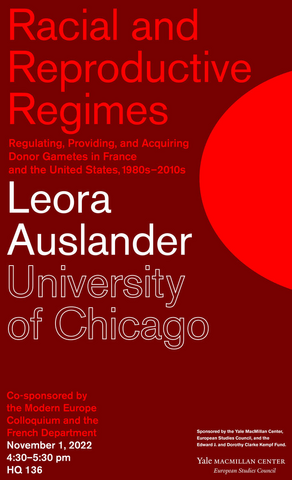The Modern Europe Colloquium on “Racial and Reproductive Regimes: Regulating, Providing, and Acquiring
Donor Gametes in France and the United States, 1980s–2010s”
By Leora Auslander, the Arthur and Joann Rasmussen Professor, Departments of Race, Diaspora, and Indigeneity and History, University of Chicago
Location: HQ, Rm 136
Reproductive technologies have allowed the institutionalized acquisition, storage, and distribution of donor sperm and ova in much of the world for over a half century. Although the technology is global, policy and practice are national and, at first glance, France and the United States appear to provide thoroughly contrastive cases. In France, access to gametes is regulated by the central state, fully covered by health insurance, and laic. In addition, the French state is, officially, race blind. In the US, there is relatively little regulation, access to genetic materials is governed by market mechanisms, the system is decentralized and neutral with respect to religion, and it makes no claim to race blindness. These differences are the product of larger societal and political stances toward the role of the state and concerning the market, religion, and race. My talk this afternoon will elucidate how those divergences, particularly but not only concerning race, play out in practice.
The Modern Europe Colloquium is generously sponsored by the Edward J. and Dorothy Clarke Kempf Memorial Fund; the European Studies Council of the Yale MacMillan Center; and the Department of French
Bio: Leora Auslander, the Arthur and Joann Rasmussen Professor in Western Civilization in the College; Professor of European Social History, University of Chicago. The primary national focus of my research is modern France, but I have found myself intrigued by research problems best treated transnationally. My most recent book, Cultural Revolutions, moves across the Atlantic world from Britain, to colonial and early national America, and finally eastwards again to France. My ongoing pair of projects, Strangers at Home and Conundrums of Commemoration, stay on the European continent but involve a comparative analysis of Paris and Berlin in the twentieth century. Finally, although I have not yet published extensively in this area, I maintain an active interest in and regularly teach the history of European colonialism and the postcolonial world it left behind.
Conceptually, my work focuses on the intersection of material culture, everyday life, and politics. I seek to explain how and why everyday things have become catalysts for conflict, means of expressing identities and constructing selves, vehicles for dissenting opinions, and sites of unexpected state intervention. My research agenda is based on the hypothesis, informed by phenomenology and feminist theory, that key to answering these questions is the close and careful study of material culture, but a close and careful study that always links the concreteness of everyday goods to the abstractions of polity, society, and economy.
Although the courses I offer are necessarily broader and more general than this research agenda, they have been systematically informed by it. I use material and well as visual and textual sources in virtually all my classes, and nearly all are transnational in reach.
Racial and Reproductive Regimes
Event time:
Tuesday, November 1, 2022 - 4:30pm to 5:30pm
Location:
Humanities Quadrangle HQ, 136
320 York Street
New Haven, CT
06511
Speaker/Performer:
Leora Auslander, Arthur and Joann Rasmussen Professor, Departments of Race, Diaspora, and Indigeneity and History, University of Chicago
Event description:
Admission:
Free
Sponsor:
See event description


